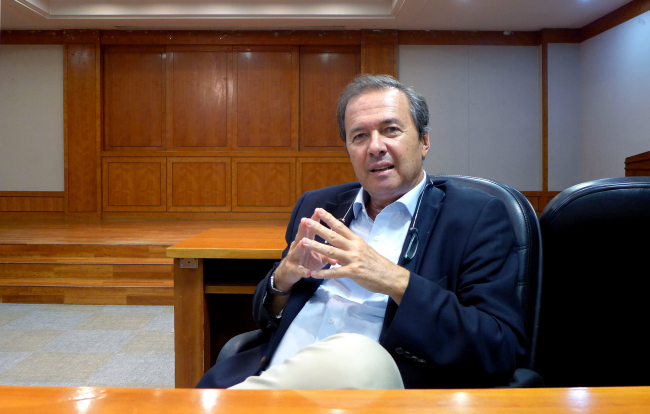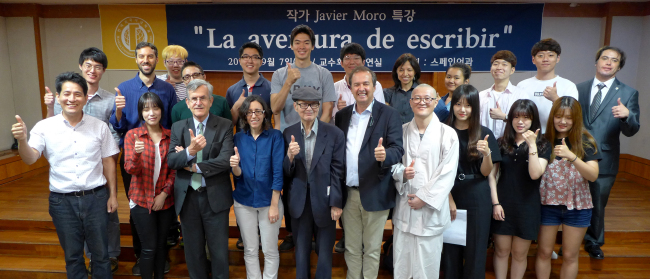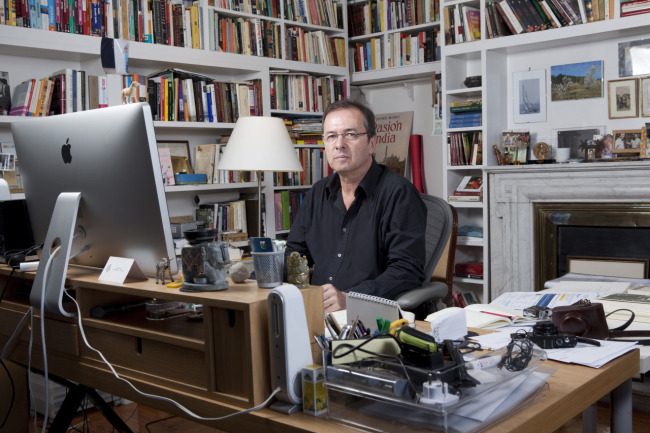Tucked away in his seaside villa on the island of Ibiza off the eastern coast of Spain, Spanish writer Javier Moro toils eight hours a day in front of a computer screen, tortuously weaving words into sentences, paragraphs and chapters to perfect his novel.
Sealed off from the rambunctious crowd outside, Moro withdraws into a “space of silence,” as he calls it, where he can let his imagination flourish.
“I conceive literature as an intellectual and personal adventure,” he told The Korea Herald last week.
“It’s a risky adventure, because you never know what you will end up with after spending from three to four years researching and writing. The novel may fall short of your expectations or exceed it.”

Historical fiction being the mainstay of his works, Moro explained that his books are based on reconstructing real stories and characters. He travels around the world to listen to people, dig into archives and leaf through documents “to rebuild the tale from within.”
“Unlike historians who rely on objective knowledge, I appeal to readers’ emotions by breathing life into past events.”
Moro, 61, is the author of eight novels that have received accolades across the globe and been translated into over 22 languages.
A creator of international bestsellers, such as “Passion India” (2005), “The Red Sari” (2008) and “The Empire, It’s you” (2011), among others, the novelist has construed affairs including the epic birth of the Brazilian nation, the murder of a Brazilian union leader amid his struggle to protect the Amazon rainforest, two Tibetan nuns’ journey across the Himalayas for freedom and the marriage of a Spanish flamenco dancer and an Indian king in the early 20th century.
Last year’s “A Flor de Piel” (“Like the Flower of Skin”) chronicles the expedition of young Spaniards in the Spanish Empire’s twilight years, where they introduced smallpox vaccines to the Americas and Philippines.
“The book is a tale of modern medicine as well as the trials and tribulations of young adventurers. They battled social and religious prejudices to advance their rational, philanthropic mission,” he said.
“In fact, Latin America became the first continent where smallpox started to recede after the expedition from 1803 to 1806. There are lively interplays between characters in this book.”

The Spanish author came to Korea last week to participate in the Cultural Communications Forum 2016 organized by the Corea Image Communications Institute, an annual gathering that brings together the world’s opinion leaders to discuss promoting Korean culture.
He followed his family’s literary footsteps, Moro explained, referring to his uncle Dominique Lapierre, a French novelist who had collaborated with American writer Larry Collins in the 1960s and ‘70s.
After graduating from University Paris VII majoring in history and anthropology, Moro took on an assignment from Lapierre to conduct research in Libya for his uncle’s work on late Libyan leader Moammar Gadhafi. There has been no turning back since, according to the author.
“Literature has meant freedom to me,” he described. “My priority is creating a good narrative. Beyond this, if it entails values or messages, all the better. I choose the story for the plot and characters, from a dramatic point of view. It has to be a page-turner.”
Moro divided his work into three parts: researching, writing and promoting.
In researching, the novelist “gets in touch with humanity” -- excavating libraries, perusing scrolls and interviewing people. “I imagine the story, dream the book. This can last two years easily.”
“Then there comes a point where you feel it needs to go out,” he added. “This is the toughest part, because there is no way out. You have to impose a timetable and commitment on yourself. You have to live a monkish life until the end of the endeavor.”
He noted, “You are your only boss. It’s excruciating in the beginning, like living in prison. But after months and months and months of discipline, you will see a bright light at the end of the tunnel.”

“On a good day,” Moro writes three to four pages, starting in the early hours of the morning when his “creative capacity is at its best.” He spends the afternoon editing his draft.
“In the beginning, I advance by half a page a day after eight hours of intense mental labor. It’s like chiseling and sculpting a chunk of stone,” the writer remarked.
“Then as the plot progresses, something magical happens. The story writes itself. After you solve most of the narrative and get a good plot going, instead of you pulling the cart, the cart carries you. This is my favorite part, full of sheer pleasure and beauty.”
After handing over the final draft to the publisher, the author can relax, spend time with his family and enjoy his life momentarily.
“But after one week, you start to feel void,” he said. “You long for the story and the characters that you had lived with intimately for the last few years of your life.”
He added, “A writer lives a double life. You have your original real life, and the life of your characters. You are obsessed by it. After you lose the other half, you can fall into a mild depression.”
For the final promotion, Moro visits other countries, which can last over a year.

Regarding his observation of the Korean culture, the novelist said he was impressed by its refinement and vitality.
“I’ve been surprised by the resilience of Korean culture. Through my visits to the National Museum of Contemporary Art, Korea Furniture Museum and National Hangeul Museum, I could see tremendous efforts to preserve Korea’s identity,” he highlighted.
“I also felt vibrancy everywhere. The ‘ppali-ppali’ mentality (of doing things quickly) has allowed Korea to reach this stage, but perhaps now you need time for leisure and creative thinking to leap forward even more. I think Korea’s true inventiveness and creativity will continue to blossom in the future.”
Noting that Spain’s flamenco grew out of a fusion of folk dances from the late 18th century, he stressed the importance of popular culture in developing more sophisticated arts.
“We shouldn’t look down on popular culture from above,” he argued. “Pop culture is necessary and exists around the world ubiquitously. We can start from it and move into new forms of culture.”
Lauding Psy’s “Gangnam Style” for bringing people and resources to Korea, Moro said many Spaniards could not conceptualize Korea five years ago, but they widely identify the country now, mostly with technology and dynamism.
“The song has really communicated throughout the world,” he said.
By Joel Lee (joel@heraldcorp.com)
-
Articles by Korea Herald



![[Exclusive] Korean military set to ban iPhones over 'security' concerns](http://res.heraldm.com/phpwas/restmb_idxmake.php?idx=644&simg=/content/image/2024/04/23/20240423050599_0.jpg&u=20240423183955)




![[Herald Interview] 'Amid aging population, Korea to invite more young professionals from overseas'](http://res.heraldm.com/phpwas/restmb_idxmake.php?idx=644&simg=/content/image/2024/04/24/20240424050844_0.jpg&u=20240424200058)
![[Pressure points] Leggings in public: Fashion statement or social faux pas?](http://res.heraldm.com/phpwas/restmb_idxmake.php?idx=644&simg=/content/image/2024/04/23/20240423050669_0.jpg&u=)










